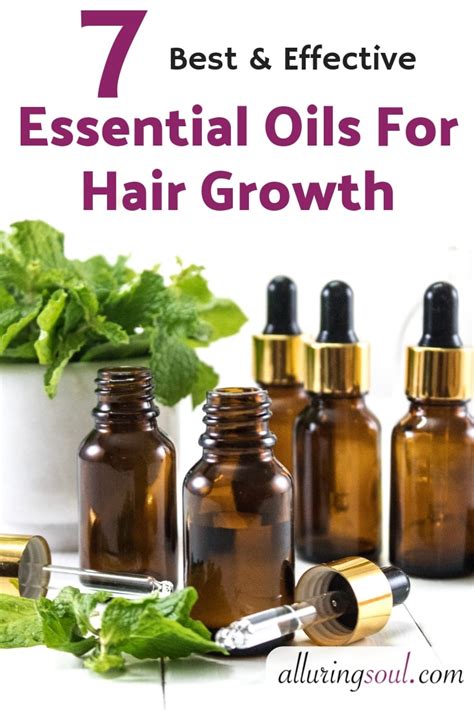Achieving luscious, healthy hair is a common goal, and the search for effective hair growth solutions has led to exploring natural remedies like essential oils. Certain oils possess properties that are believed to promote hair follicle stimulation, improve scalp health, and enhance hair growth. This article delves into the world of essential oils and their potential benefits for hair growth, providing insights into which oils to consider and how to incorporate them into your hair care routine.

Oils That Promote Hair Growth
Research and anecdotal evidence suggest that several essential oils may contribute to hair growth. Here are some commonly recognized oils:
-
Rosemary Oil: Rosemary oil is rich in antioxidants and anti-inflammatory compounds. Studies have demonstrated its potential to stimulate hair follicles and enhance blood circulation to the scalp, promoting hair growth.
-
Peppermint Oil: Peppermint oil contains menthol, which creates a cooling effect on the scalp. This cooling sensation may increase blood flow, providing nutrients to the hair follicles and potentially stimulating hair growth.
-
Lavender Oil: Lavender oil is known for its calming and relaxing properties. It may also possess hair growth-promoting effects due to its ability to reduce stress, which can be a contributing factor to hair loss.
-
Tea Tree Oil: Tea tree oil, with its antifungal and antimicrobial characteristics, may aid in maintaining scalp health by reducing dandruff and other scalp conditions that can inhibit hair growth.
-
Clary Sage Oil: Clary sage oil is believed to stimulate the production of hair follicles. It may also balance hormone levels, contributing to healthy hair growth.
How to Use Essential Oils for Hair Growth
Incorporating essential oils into your hair care routine can be simple and effective. Here are some methods:
-
Scalp Massage: Dilute a few drops of essential oil in a carrier oil (such as jojoba or almond oil) and massage it into your scalp using gentle circular motions. This method promotes absorption and stimulates blood flow.
-
Hair Rinse: Add a few drops of essential oil to a cup of water and use it as a final hair rinse after shampoo and conditioner. The oils will infuse the scalp and hair with their beneficial properties.
-
Add to Shampoo or Conditioner: Mix a few drops of essential oil into your regular shampoo or conditioner. This method ensures even distribution and allows the oils to work their magic during your regular hair washing routine.
Common Mistakes to Avoid
When using essential oils for hair growth, it’s crucial to avoid certain mistakes:
-
Undiluted Use: Always dilute essential oils in a carrier oil before applying them to the scalp. Undiluted oils can be harsh and potentially cause irritation.
-
Overuse: Excessive use of essential oils can lead to skin sensitivities or other adverse reactions. Use them in moderation and as directed.
-
Allergic Reactions: Before using any essential oil, conduct a patch test on a small area of skin to check for potential allergic reactions.
Frequently Asked Questions
1. How long does it take to see results from using essential oils for hair growth?
Results may vary depending on individual factors, but some people report seeing improvements within a few weeks of regular use.
2. Can I use any essential oil for hair growth?
Not all essential oils promote hair growth. Focus on oils that have research or anecdotal support, such as rosemary, peppermint, and lavender.
3. Is it safe to use essential oils on all hair types?
Yes, essential oils can be beneficial for most hair types when used correctly. However, if you have any specific concerns, consult a healthcare professional.
4. Can I use essential oils for hair growth if I have a sensitive scalp?
Proceed with caution if you have a sensitive scalp. Always dilute essential oils and perform a patch test before applying them to your scalp.
5. How often can I use essential oils for hair growth?
Incorporate essential oils into your hair care routine a few times per week for optimal benefits.
6. Can I mix different essential oils for hair growth?
Yes, you can create your own blends of essential oils. Experiment with different combinations to find what works best for you.
Table 1: Essential Oils for Hair Growth
| Essential Oil | Key Benefits |
|---|---|
| Rosemary | Stimulates hair follicles, promotes blood flow |
| Peppermint | Cools and increases blood flow to the scalp |
| Lavender | Reduces stress, may enhance hair growth |
| Tea Tree | Anti-fungal, maintains scalp health |
| Clary Sage | Stimulates hair follicle production, balances hormones |
Table 2: How to Use Essential Oils for Hair Growth
| Method | Instructions |
|---|---|
| Scalp Massage | Dilute oil in carrier oil, massage into scalp |
| Hair Rinse | Add oil to water, use as a final rinse |
| Add to Shampoo/Conditioner | Mix oil into regular hair products |
Table 3: Common Mistakes to Avoid
| Mistake | Description |
|---|---|
| Undiluted Use | Can cause irritation, sensitization |
| Overuse | May lead to adverse reactions |
| Allergic Reactions | Test for sensitivities before use |
Table 4: Frequently Asked Questions
| Question | Answer |
|---|---|
| How long for results? | Varies, may see improvements within weeks |
| Any essential oil for hair growth? | Focus on research-supported oils like rosemary, peppermint |
| Safe for all hair types? | Yes, but proceed with caution for sensitive scalps |
| Frequency of use? | A few times per week is optimal |
| Can I mix essential oils? | Yes, create your own blends |
Conclusion
Essential oils offer a natural approach to promoting hair growth. Incorporating them into your hair care routine can provide benefits such as stimulating hair follicles, improving scalp health, and reducing hair loss. By using essential oils wisely, understanding their potential, and avoiding common mistakes, you can harness their power to achieve healthier, more vibrant hair. Remember to consult a healthcare professional if you have any specific concerns or allergies.
